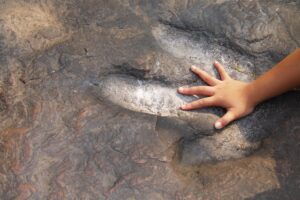The (im)moral use of knowledge in the university and Jurassic Park
The (im)moral use of knowledge in the university and Jurassic Park
What if our university educations do not just teach us knowledge about the world, but also – unless we are careful – mould us into people who destroy it?
This article was written in preparation for our round table on ‘End of Humanity(s)?’
*** Donald Gennaro and John Hammond chuckling over a joke about having “a coupon day” ***
Dr Ian Malcolm: “If I may, if I may. Uh, I’ll tell you the problem with the scientific power that you’re, that you’re using here. It didn’t require any discipline to attain it. You know, you read what others had done, and you, and you took the next step. You didn’t earn the knowledge for yourselves, so you don’t take any responsibility… for it. You stood on the shoulders of geniuses, uh, to accomplish something as fast as you could, and before you even knew it, you had, you’ve patented it, and packaged it, and slapped it on a plastic lunch box, and now [*bangs the table*] you’re selling it, you wanna sell it, well.”
John Hammond: “I don’t think you’re giving us our due credit. Our scientists have done things which nobody has ever done before.”
Ian Malcolm: “Yeah, yeah, but your scientists were so preoccupied over whether or not they could, they didn’t stop to think if they should.”
This iconic scene from 1993’s Jurassic Park foreshadows the disastrous events that will soon transpire in the course of just a few hours.[1] At the heart of this brief interaction is the question of knowledge and whether knowledge requires more than just itself to be used morally. To place it in the starker terms of the Jurassic universe, leaves us with a startling question: what if knowledge (perhaps especially scientific knowledge) that is 1) held in abstract, 2) exalted as a power unto itself, and 3) neither given any reflection about how it should be used nor considered to need that reflection is not a recipe for progress but only for disaster?
Perhaps what we are asking in simpler terms than Dr Ian Malcolm is this: can you separate knowledge from ethics? Can you have a process of knowing without a process of reflection on what you should do with that knowledge?
Science: a new sola fide?
Nearly 30 years ago, Dr Malcolm’s character raised an essential issue about how scientific power or knowledge relates to the real world. The growing public push for greater focus on STEM subjects at schools/universities (i.e. subjects related to Science, Technology, Engineering, and Mathematics)[2] [3] combined with dropping funding for humanities-related departments[4] and waves of humanities departments being cut[5] [6] [7] only highlights this issue, especially now as the financial effects of COVID-19 hit the universities.[8] A world with a preponderance of science-related fields as the humanities wither away in many universities is a reality some believe is already underway. Yet, Malcolm’s character raises perhaps the greatest danger of an overly scientistic educational structure, one where the question is always about how something can be done and not so much about whether it should be done.
Science obviously offers many great things to the world. Few of the people concerned about a possible eclipse of the humanities fields in the academy and society would want to strip science from the university or even disenfranchise students from becoming scientists of various kinds contributing their important work and creative solutions to the world. This beneficial aspect of the various sciences cannot be overlooked.
However, the question is not so much whether science should be in the university, but whether it should be alone in the university. Physicist turned philosopher of science Thomas Kuhn, decades earlier than Jurassic Park, exposes that science has its own outlook on the world and, more importantly, its own kind of epistemology (a theory on how one comes to know and also knows that one knows as well as how a person relates to knowledge[9]). The epistemology he identifies is not just dismissive of other disciplines but even its own discipline’s past theories:
“Why should progress also be the apparently universal concomitant of scientific revolutions? … Revolutions close with a total victory for one of the two opposing camps. Will that group ever say that the result of its victory has been something less than progress? … To them, at least, the outcome of revolution must be progress, and they are in an excellent position to make certain the future members of their community will see past history in the same way. … Scientific education makes use of no equivalent for the art museum or the library of classics, and the result is a sometimes drastic distortion in the scientist’s perception of his discipline’s past. More than the practitioners of other creative fields, … he comes to see it as progress. No alternative is available to him while he remains in the field.”[10]
In other words, science not only thinks that its methodology is superior to the humanities’ methodology for coming to know something and knowing that one knows something. It orients itself towards its own knowledge as if that is all there is and all it would ever need. Moreover, it cannot consider previously dominant theories as places where there is truth, or even something insightful to the present, per se, because the present theories are the theories. Kuhn calls a change from one theory to another a revolution, not just because the change of perspective is seen as revolutionary, but because it entails a revolution against the previous theory and leaves little evidence of the previous theory’s existence when complete.
Moreover, scientific fields tend to be incredibly restrictive on who they allow to know what when.
“In these fields the student relies mainly on textbooks until, in his third or fourth year of graduate work, he begins his own research. … Until the very last stages in the education of a scientist, textbooks are systematically substituted for the creative scientific literature that made them possible. … Of course, it is a narrow and rigid education, probably more so than any other….”[11]
Kuhn’s objection here is that scientific disciplines tend not to inculcate the virtue of critical thinking or questioning the status quo as much as they often think or claim themselves to. Rather, the educational method suggests an incredibly dogmatic outlook on the world through science without the necessary information or skills to sufficiently challenge that dogmatism. The skills it cultivates are not about thinking about what knowledge is or what it is for, but about finding and using what it assumes counts as knowledge. Or to put it more provocatively, Kuhn is concerned that science left on its own will just reduce to the discipline of special interests, of commodification and commercialisation, and finally to academic politics, but without a reflexive enough orientation (either towards the world or themselves) to notice.
The virtues of knowledge
This is precisely Dr Malcolm’s critique of John Hammond and his team: they are so hungry to make ‘scientific progress’ at all costs and then profit from it that they never truly come to knowledge with the kind of respect it warrants. He pushes along a similar vein to Kuhn suggesting that science cannot be separated from scientists. Right after Donald cracks his joke about ‘coupon day’, Malcolm interjects:
Ian Malcolm: “The lack of humility before nature that’s being displayed here, um, staggers me.”
Donald Gennaro: “Thank you Dr. Malcolm, but I think things are a little bit different than both you and I have feared.”
Ian Malcolm: “Yeah, I know. They’re uh, a lot worse.”
Donald Gennaro: “Now, wait a second now. We haven’t even seen the park yet. There’s no reason–”
John Hammond: “Donald, Donald, let him talk. There’s no reason — I want to hear every viewpoint. I really do.”
Ian Malcolm: “Yeah, don’t you see the danger, John, inherent in what you’re doing here? Genetic power’s the most awesome force this planet’s ever seen, but you wield it like a kid who’s found his dad’s gun.”[12]
The danger of separating knowledge from a reflective orientation towards that knowledge, from being the kind of person that is ready for and suited to that knowledge, is precisely that knowledge is so powerful. Playing with it could be far more dangerous than the knower may realise. Malcolm is warning of a kind of naivety that Kuhn fears science is extremely susceptible to. It is not enough to be able to know something or even know how to do something; it matters just as much whether one is able to be the kind of person who can know whether they should know it or do it.
The humanities, however, are not immune from just this sort of epistemology. It is just as easy for someone in the humanities and social sciences to not even consider whether they are the kind of person who can be trusted with knowledge.[13] Philosophers, historians, theologians, activists, journalists, etc. are just as able to turn knowledge into a tool, a trophy, or a weapon as scientists. Dr Malcolm is warning against a certain way of orienting to knowledge, of making knowledge so much the kind of thing that you gain and wield that it ceases to matter whether you should say it, write it, or use it – it only matters whether you can.
That said, Malcolm and Kuhn have not just warned about human capacity to use knowledge without regard for whether it should. They have also signalled that the mode and style of formation involved in acquiring knowledge cannot be separated from knowing what to do with it. Malcolm warns that Hammond and his scientists have not been formed to be the kind of people who can use the knowledge well because of the way that they have learned it. This is also what concerns Kuhn, that scientists are being formed by their scientific education to be the kind of people who only ask and value scientific kinds of questions, and therefore answers without an awareness of how their human inclinations, motives, and politics shape their science. The educational mode itself is narrow and so focused that while they might learn the skills needed to learn or develop science, they do not seem likely to develop into the kind of people in the process who can be trusted to know, they fail to cultivate the kind of rationality that is morally and sociologically reflexive.
This is a risk for the humanities just as it is for STEM. But the humanities as a set of disciplines have a greater in-built orientation towards reflexively asking the right questions of itself to help both people and the disciplines become the kind that do not just know information but know the questions that need to be asked of it.[14] [15] [16] [17] [18] [19] The humanities are not just about knowledge, but about virtues of knowledge. The humanities are about teaching people what knowledge is for and not just what it is. Moreover, the humanities are concerned with how being human relates to knowledge. They look at themselves. They have categories for greed, pride, courage, and hope. They have not just the categories of true/false but good/evil. Likewise, as Kuhn points out, the humanities are not just concerned with the theories of the present, but of the past and of the possible. The kind of education they provide integrates many kinds of learning, disciplines, and perspectives. Because of these features, the humanities involve a mode of learning that better helps a person become someone who can be trusted with knowledge. Thus, it has something unique to offer not just to itself but to the university as whole including the sciences and other disciplines.
Humanities offer a kind of knowledge production that is sensitive to epistemic and social reflexivity, that is, to enabling moral reflection and refinement of modes of rationality operative in the diverse domains of use. Science cannot ask whether something is good, just whether something is possible; business cannot ask whether a product or its production is good, just whether it is profitable. The humanities can ask however exactly what Dr Malcolm thought was necessary. Not just “Is this knowable?” or even “How can I know or do such-and-such?” but also “Am I the kind of person who should know it? Can I be trusted to use this knowledge for good?”
Is being able to ask the question the beginning of an answer?
But someone might ask: the humanities claim they have the only form of rationality which can operate with moral reflexivity. But what if this is only the expression of its (subconscious?) interest in controlling all forms of knowledge production? This would make it just like other forms of knowledge production that seem to be interested in controlling all the forms of knowledge production. In other words, are the humanities just using their rationality to grab power in the academy and/or society?
That is an important question: but it would seem only the rationality operative and constitutive of the humanities is capable of even asking such a question. The intuitive value of such a question already admits the importance of the mode of rationality at home in the humanities and suggests that the humanities really are aptly named, for they are the expression of a form of human rationality generating and generated by the nature of being human itself.
What do leadership, tolerance, and tension have to do with each other? Find out more on the EARS Dashboard.
Sources
[1] Jurassic Park. Directed by Stephen Spielberg. Universal Pictures, 1993.
[2] The future for STEM in Europe – EURACTIV.com
[3] The Real Reason the Humanities Are ‘in Crisis’
[4] Defunding arts degrees is the latest battle in a 40-year culture war
[5] Shrinking liberal arts programs raise alarm bells among faculty
[6] No history, no languages… the end of humanities only deepens divides | Kenan Malik
[7] Colleges Are Slashing Budgets During the Coronavirus Pandemic
[8] Scientism, the coronavirus, and the death of the humanities | OUPblog
[9] Epistemology (Stanford Encyclopedia of Philosophy)
[10] Thomas S. Kuhn The Structure of Scientific Revolutions, 2nd ed. (Chicago: University of Chicago Press, 1970), 166-67.
[11] Thomas S. Kuhn The Structure of Scientific Revolutions, 2nd ed. (Chicago: University of Chicago Press, 1970), 165-66.
[12] Jurassic Park. Directed by Stephen Spielberg. Universal Pictures, 1993.
[13] Hence the need for Pierre Bourdieu to co-author with Loïc J.D. Wacquant, An Invitation to Reflexive Sociology (Chicago: University of Chicago Press, 1992). LIkewise
[14] Cf. Alister E. McGrath, The Territories of Human Reason: Science and Theology in an Age of Multiple Rationalities (Oxford: Oxford University Press, 2019).
[15] Analysis | Why we still need to study the humanities in a STEM world
[16] Here are 9 reasons why humanities matter. What’s your number 10?
[17] view on the humanities: the importance of being rounded | Editorial | The Guardian
[18] Kenneth R.R. Gros Louis, “Why the Humanities Are More Important than Ever”, Business Horizons 24 (1981): 19-24.
[19] Perspective | Why liberal arts and the humanities are as important as engineering






